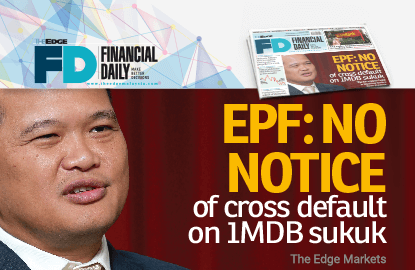
This article first appeared in The Edge Financial Daily, on May 4, 2016.
KUALA LUMPUR: The Employees Provident Fund (EPF) has yet to decide to call for an early redemption of its investment in 1Malaysia Development Bhd’s (1MDB) RM5 billion sukuk as the trustees have not deemed there is a cross default on the debt papers.
EPF chief executive officer Datuk Shahril Ridza Ridzuan said that the trustees for 1MDB’s sukuk had not given any notice to the provident fund on whether there had been a cross default on Islamic bonds.
“We’ll just have to wait and see if the trustees deem that there’s a cross default and whether they have to bring the matter to bondholders. At this point, there’s nothing so far,” Shahril told the media yesterday after the release of the EPF’s annual report for 2015.
According to him, the EPF does not have significant exposure. It has invested RM200 million in the sukuk.
“Our exposure to 1MDB is very limited. We have RM200 million out of the first RM5 billion issuance when it was still known as the Terengganu Investment Authority.
“That exposure is fully government-guaranteed. We don’t have a problem with it; we’ve never had an issue in terms of the servicing of payments by 1MDB,” he said.
Shahril acknowledged that the EPF is monitoring the current developments surrounding 1MDB, noting that there was “quite clearly a cause for concern”.
“In any event that there are major problems with 1MDB, the government will step in to cover the debt to all bondholders,” said Shahril.
He also noted that the EPF was previously exposed to 1MDB by virtue of its investment in the latter’s power plants, before the assets were sold to China General Nuclear Power Corp.
Asked if the fund is eyeing to invest in 1MDB’s Bandar Malaysia project, Shahril said not at this point in time.
“We do look for interesting deals which can create value for the EPF. At this point in time, we have not seen anything yet from that side,” he said.
Going forward, he said the EPF aims to further expand its domestic investments, especially in inflation-linked assets, including in the utilities and infrastructure segments.
“We have done a number of deals in the highway space, waste management and energy. We were a big subscriber for Tenaga Nasional Bhd’s new issue [of bonds] to support the development of new power plants. We believe there are opportunities in Malaysia to invest in, especially for long-term investments,” Shahril commented.
Shahril pointed out that the fund’s investment in Kwasa Land Sdn Bhd, which is collaborating with Malaysian Resources Corp Bhd for the development of the Rubber Research Institute land, as well as its partnership with Eco World Development Group Bhd in the Bukit Bintang City Centre project as strategic moves to expand its domestic investments.
“We are aiming to do the same in the future with other developers. We want to increase our exposure to real [estate] assets. There are some advantages to investing in these assets, as they are inflation-linked in terms of value and that they are not subject to such volatile market price movements, which help for future planning,” he said.